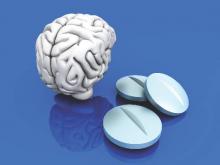Benzodiazepine use by elderly adults did not seem to be causally related to an increased risk for dementia and cognitive decline, in a prospective study.
The study included 3,434 individuals aged 65 years or older without dementia. For at least 10 years prior to enrollment in the study, all participants had been members of Group Health, an integrated health delivery system in the Northwest United States that maintains computerized pharmacy data, including names, strengths, dates dispensed, and amounts dispensed of drugs used by its members.
Thirty percent of participants had filled at least one prescription for a benzodiazepine in the 10 years before entering the study, with 3% of participants having used the drug within 6 months of study entry. The researchers categorized patients based on their level of use, with patients falling into the highest-use category having taken at least 121 total standardized daily doses (TSDDs). The median level of use within that group was 375 TSDDs, equivalent to slightly over a year of daily use.
In 2004, the study began continuous enrollment to replace those who developed dementia, died, or dropped out. Participants were assessed for cognitive function upon beginning participation in the study and every 2 years afterward. All participants were followed until the earliest onset of dementia, disenrollment from Group Health, or their last study visit before Sept. 30, 2012.
The researchers found no association between the use of benzodiazepines at the TSDD level defined as highest use in this study and dementia (hazard ratio, 1.07) or Alzheimer’s disease (HR, 0.95), compared with nonuse. “When we split the highest category of benzodiazepine use into two groups, the hazard ratio for dementia was 1.11 (0.78-1.58) for 121-364 TSDDs and 1.03 (0.73-1.44) for greater than or equal to 365 TSDDs. Findings for Alzheimer’s disease were similar,” said Shelly L. Gray, Pharm.D., professor of pharmacy at the University of Washington School of Pharmacy, Seattle, and her colleagues.
A slightly increased risk for dementia for study participants classified as low users (taking 1-30 TSDDs) or moderate users (taking 31-120 TSDDs) of benzodiazepine was found, when compared with nonusers. Low users of benzodiazepine were also at increased risk for Alzheimer’s disease (HR, 1.27).
“In conclusion, we found a slightly higher risk of dementia in people with the lowest benzodiazepine use but no increased risk in those with the highest level of exposure. … Overall, our pattern of findings does not support the theory that cumulative benzodiazepine use at the levels observed in our population is causally related to an increased risk for dementia or cognitive decline. … Nonetheless, given the mixed evidence regarding benzodiazepines and risk of dementia and that these drugs are associated with many adverse events, health care providers are still advised to avoid benzodiazepines in older adults to prevent important adverse health outcomes, withdrawal, and dependence,” according to the researchers.
Read the study in the BMJ (doi: 10.1136/bmj.i90).


